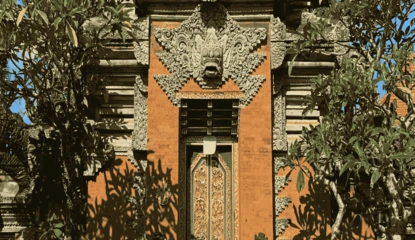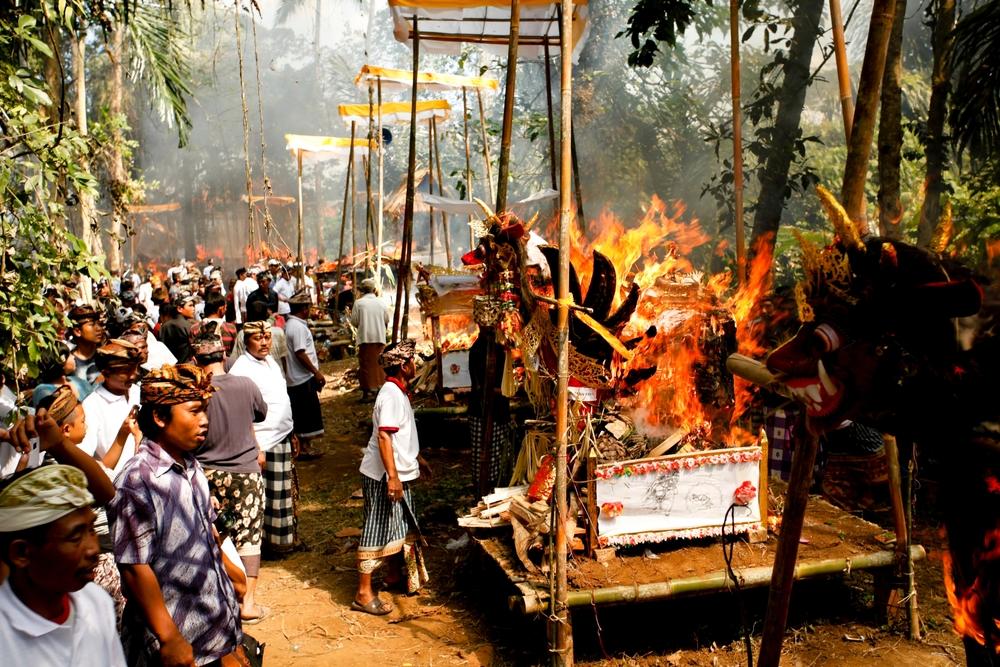Have you ever heard of the Ngaben ceremony in Bali? This sacred tradition, rich in spiritual and symbolic meaning, is not just about burning the body.
Each procession of the Ngaben ceremony carries a profound story and philosophy. Let's delve deeper and appreciate the beauty of Balinese culture that is often misunderstood.
The Meaning and Purpose of Ngaben Ceremony in Balinese Hindu Tradition
If you've ever been to Bali and heard about Ngaben, you might think of a grand and sacred funeral pyre.
But did you know that Ngaben is not just a death ritual?
In Balinese Hinduism, Ngaben is a spiritual procession to escort the spirit to a higher realm, free from worldly attachments and ready for rebirth, or even achieving moksha (eternal freedom from the cycle of reincarnation).
So, when Balinese families perform Ngaben, they don't drown in sadness. Instead, they celebrate life and let go with great sincerity.
It is a form of love, respect, and a deep belief in the soul's journey after death.
The Ngaben Procession is Full of Symbols and Spirituality
If you have the opportunity to see a Ngaben ceremony in person, you will witness how detailed and sacred each stage is. From symbols, prayers, to artistic elements, everything has a deep meaning.
-
Bade making
A bade is a colorfully-coated tower used to carry the body to the pyre.
Its height usually reflects the social status of the family. The bade is like a "spiritual vehicle" that takes the spirit to the higher realms.
As the bade is paraded, you will hear the gamelan and sacred chants that accompany it.
-
Ngajum Kajang
At this stage, the family makes a kajang, which is a kind of "spirit letter" written on palm leaves.
The kajang contains the identity of the spirit to be cremated, and is believed to be a spiritual ticket for the spirit to be recognized in the beyond. The ceremony is full of prayers and symbols of purification.
-
Ngeseng/Mapralina Sekah
This is the centerpiece of the ceremony, the cremation of the body. When the fire is lit, the family and community will accompany it with prayers and baleganjur music.
For those of you watching, the atmosphere can be both emotional and electrifying because all the spiritual elements are so strongly present.
-
Nuduk Galih
After cremation, the remaining ashes and bones are collected in a process called Nuduk Galih.
All is done with great care, as these parts are considered to still have spiritual energy and should be respected.
-
Nganyut Sekah
Finally, the ashes are taken to the river or sea to be washed away. The sea is considered the gateway to the spiritual realm.
If you witness this stage, you will feel a sacred atmosphere mixed with relief, as if the spirit has truly been liberated.
Types of Ngaben Based on Social Status and Situation
Are all Ngaben performed in the same way? The answer is no. Several types of Ngaben are differentiated based on family conditions and specific situations:
-
Ngaben Sawa Wedana
This is the most complete Ngaben, performed while the body is still intact and has not been buried.
It is usually performed by financially well-off families, with a procession full of traditional ornaments and accompaniment.
-
Ngaben Asti Wedana
If the body has already been buried due to time or cost considerations, Ngaben is performed on the exhumed bones. This is quite common in Bali.
-
Private Ngaben
This type of Ngaben is performed without the physical remains, usually because the body has been lost or cremated elsewhere.
However, the family still holds a ceremony to honor the spirit.
-
Ngaben Ngelungah
This is a ceremony for children who have not yet grown teeth. As they are still considered sacred, the Ngaben procession is simpler, but still performed with love and respect.
-
Mass Ngaben
If you see a massive Ngaben ceremony with many bades at once, it is usually Mass Ngaben.
Many families perform it together for cost and time efficiency, but still with a substantial spiritual value.
The Obligation to Perform Ngaben in the Spiritual Life of Balinese People
For Balinese Hindus, Ngaben is a spiritual obligation. Although it can be time-consuming and costly, this ritual is considered very important for the balance between the human world and the spirit world.
Because of this, you will find many families who are willing to save up for years to perform Ngaben for their parents or loved ones.
Ngaben is not just about burning the body; it is about letting go sincerely, ensuring the spirit does not get lost, and maintaining harmony in family life.
Performing Ngaben is considered the highest form of a child's devotion to their parents.
So, if you're interested in exploring Balinese culture, getting to know the Ngaben ceremony can open your mind to the way the Balinese view life, death, and the universe.












